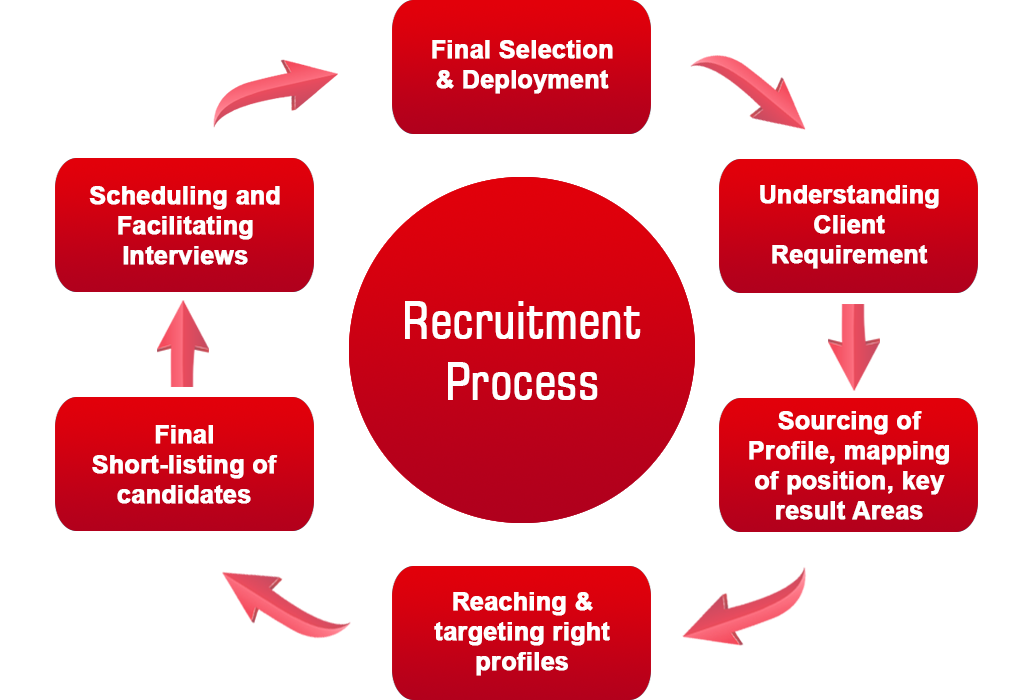
RECRUITMENT
Swati Management Services is a Recruitment & Staffing Agency in Noida, Delhi/NCR. Recruitment is the process of discovering competent employee out of available candidates in the market who are suitable to job and according to organisation requirements.
Recruitment is a positive process of searching for prospective employees and stimulating them to apply for the jobs in the organisation. When more persons apply for jobs then there will be a scope for recruiting better persons.
The job-seekers too, on the other hand, are in search of organisations offering them employment. Recruitment is a linkage activity bringing together those with jobs and those seeking jobs. In simple words, the term recruitment refers to discovering the source from where potential employees may be selected. The scientific recruitment process leads to higher productivity, better wages, high morale, reduction in labor turnover and enhanced reputation. It stimulates people to apply for jobs; hence it is a positive process.
Recruitment is concerned with reaching out, attracting, and ensuring a supply of qualified personnel and making out selection of requisite manpower both in their quantitative and qualitative aspect. It is the development and maintenance of adequate man- power resources. This is the first stage of the process of selection and is completed with placement.
RECRUITMENT PROCESS
1.Recruitment Planning
The first step involved in the recruitment process is planning. Here, planning involves to draft a comprehensive job specification for the vacant position, outlining its major and minor responsibilities; the skills, experience and qualifications needed; grade and level of pay; starting date; whether temporary or permanent; and mention of special conditions, if any, attached to the job to be filled ”
2.Strategy Development
Once it is known how many with what qualifications of candidates are required, the next step involved in this regard is to devise a suitable strategy for recruiting the candidates in the organisation.
The strategic considerations to be considered may include issues like whether to prepare the required candidates themselves or hire it from outside, what type of recruitment method to be used, what geographical area be considered for searching the candidates, which source of recruitment to be practiced, and what sequence of activities to be followed in recruiting candidates in the organisation.
3.Searching
This step involves attracting job seekers to the organisation. There are broadly two sources used to attract candidates.
4.Screening
Though some view screening as the starting point of selection, we have considered it as an integral part of recruitment. The reason being the selection process starts only after the applications have been screened and shortlisted. Let it be exemplified with an example.
Job specification is invaluable in screening. Applications are screened against the qualification, knowledge, skills, abilities, interest and experience mentioned in the job specification. Those who do not qualify are straightway eliminated from the selection process.
The techniques used for screening candidates vary depending on the source of supply and method used for recruiting. Preliminary applications, deselection tests and screening interviews are common techniques used for screening the candidates.
5.Evaluation and Control
Given the considerable cost involved in the recruitment process, its evaluation and control is, therefore, imperative.
The costs generally incurred in a recruitment process include:
- Salary of recruiters
- Cost of time spent for preparing job analysis, advertisement
- Administrative expenses
- Cost of outsourcing or overtime while vacancies remain unfilled
- Cost incurred in recruiting unsuitable candidates

